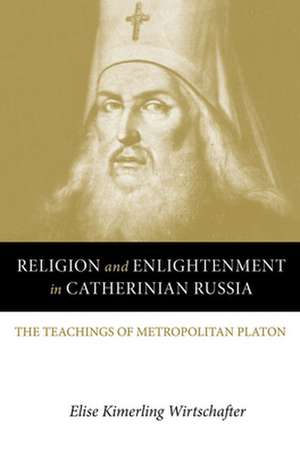Religion and Enlightenment in Catherinian Russia – The Teachings of Metropolitan Platon
Autor Elise Kimerling Wirtschafteren Limba Engleză Paperback – 6 mar 2014
This valuable study explores the Russian Enlightenment with reference to the religious Enlightenment of the mid to late eighteenth century. Grounded in close reading of the sermons and devotional writings of Platon (Levshin), Court preacher and Metropolitan of Moscow, the book examines the blending of European ideas into the teachings of Russian Orthodoxy. Highlighting the interplay between Enlightenment thought and Orthodox enlightenment, Elise Wirtschafter addresses key questions of concern to religious Enlighteners across Europe: humanity’s relationship to God and creation, the distinction between learning and enlightenment, the role of Christian love in authority relationships, the meaning of free will in a universe governed by Divine Providence, and the unity of church, monarchy, and civil society. Countering scholarship that depicts an Orthodox religious culture under assault from European modernity and Petrine absolutism, Wirtschafter emphasizes the ability of Russia’s educated churchmen to assimilate and transform Enlightenment ideas. The intellectual and spiritual vitality of eighteenth-century Orthodoxy helps to explain how Russian policymakers and intellectuals met the challenge of European power while simultaneously coming to terms with the broad cultural appeal of the Enlightenment’s universalistic human rights agenda.
Religion and Enlightenment in Catherinian Russia defines the Russian Enlightenment as a response to the allure of European modernity, as an instrument of social control, and as the moral voice of an emergent independent society. Because Russia’s enlightened intellectuals focused on the moral perfectibility of the individual human being, rather than social and political change, the originality of the Russian Enlightenment has gone unrecognized. This study corrects images of a superficial Enlightenment and crisis-ridden religious culture, arguing that in order to understand the humanistic sensibility and emphasis on individual dignity that permeate Russian intellectual history, and the history of the educated classes more broadly, it is necessary to bring Orthodox teachings into the discussion of Enlightenment thought. The result is a book that explains the distinctive origins of modern Russian culture while also allowing scholars to situate the Russian Enlightenment in European and global history.
Preț: 293.81 lei
Nou
Puncte Express: 441
Preț estimativ în valută:
56.22€ • 59.15$ • 46.67£
56.22€ • 59.15$ • 46.67£
Carte tipărită la comandă
Livrare economică 16-30 ianuarie 25
Preluare comenzi: 021 569.72.76
Specificații
ISBN-13: 9780875806983
ISBN-10: 0875806988
Pagini: 200
Dimensiuni: 151 x 227 x 16 mm
Greutate: 0.3 kg
Ediția:NIP
Editura: MB – Cornell University Press
ISBN-10: 0875806988
Pagini: 200
Dimensiuni: 151 x 227 x 16 mm
Greutate: 0.3 kg
Ediția:NIP
Editura: MB – Cornell University Press
Recenzii
“[Wirtschafter] provides a fascinating, well-researched, persuasively argued case study though a close reading of the sermons of one of the Russian Orthodox Church’s most important clerics, Metropolitan Platon.”
—The Journal of Modern History
“A fine achievement that deserves attention from non-Russianists.” (add to website?)
—European History Quarterly
"This is a valuable poineering study. Wirtschafter has mastered not only the enormous literature on the Western enlightenment, but sheds entirely new light on its Russian parallel."
—Gregory Freeze, Brandeis University
—The Journal of Modern History
“A fine achievement that deserves attention from non-Russianists.” (add to website?)
—European History Quarterly
"This is a valuable poineering study. Wirtschafter has mastered not only the enormous literature on the Western enlightenment, but sheds entirely new light on its Russian parallel."
—Gregory Freeze, Brandeis University
“Wirtschafter {offers a} detailed and engaging exposition of Platon’s sermons …”
—Times Literary Supplement
—Times Literary Supplement
Notă biografică
Elise Kimerling Wirtschafter is Professor of History at California State Polytechnic University, Pomona. Her most recent publications include Russia’s Age of Serfdom 1649-1861 and The Play of Ideas in Russian Enlightenment Theater.
